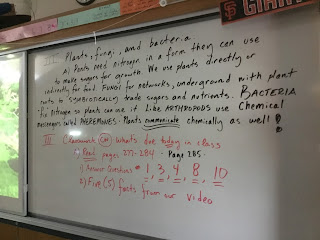Coastside Science
Science and math notes and assignments.
Wednesday, March 12, 2025
Tuesday, March 11, 2025
Friday, March 7, 2025
Week #26 Open Note quiz
Test Link:
https://www.classroomclipboard.com/854670/Test/33887CE8-1CA6-4712-86D3-54CF45C891A1 Access code: arthropod |
Thursday, March 6, 2025
March 6th - Science - personal essay -
Science personal essay - March 6th - 2025 - Thursday
Earlier, this school year, we used the movie and book “The Martian” as a vehicle for exploring our Solar System, geology, the history of the universe, physics, chemistry, and all of the factors that make Earth a unique harbor of life in the universe. At one point we estimated, as a math tie-in, the total number of stars and planets in the universe. This was also a good opportunity to explore scientific notation and the scientific method. The total number of stars was estimated at, about, 40 sextillion. That’s a “four” followed by twenty two zeros. In all of those potential solar systems, in all of those potential planets, in all the known universe - THIS is the ONLY place where life is known to exist. A relatively thin biosphere extending a few miles below and above your feet right now.
Which brings us to our study of plants, fungi, animals, bacteria, protists, and the interaction of living things. During the unit with “The Martian” is was easy to poke fun at Elon Musk regarding his “plans” to colonize Mars. Now that Musk is one of the main players responsible for the firing of thousands of government scientists there’s a bit more of an urgency to both recap what we’re trying to protect and the foolishness of using our dwindling resources on billionaire’s flights of fancy.
Musk has stated Space X will need to send thousands of rockets to Mars in order to establish a colony.
Here on Earth, thanks to four billion years of biological evolution, we have a biosphere with interacting kingdoms of living things from bacteria to fungi.We have an atmosphere that took billions of years to build up enough free oxygen to support complex animal life. We have a planet that is just the right size, with a molten metal core, to provide Earth with a strong magnetic field to protect our fragile biosphere from the punishing radiation of our sun. Sunlight runs photosynthesis on a word that is being thrown out of balance to the point where we are now experiencing a sixth mass extinction of species due to the human impact on the environment. Invasive species, deforestation, habitat destruction, and plastic pollution are just a few of the massive challenges facing our biosphere which is under assault.
Billionaires destroying our planet’s ability to sustain complex life while enriching themselves at the expense of a world in need of environmental leadership is not a path towards a better future for our children. In physics we learn about trajectories and where an object is likely to land given an impulse. Currently, our environment is on a path for biological collapse to satisfy the short term needs of the few over the long term needs of a sustainable and healthy biosphere.
Subscribe to:
Posts (Atom)

















